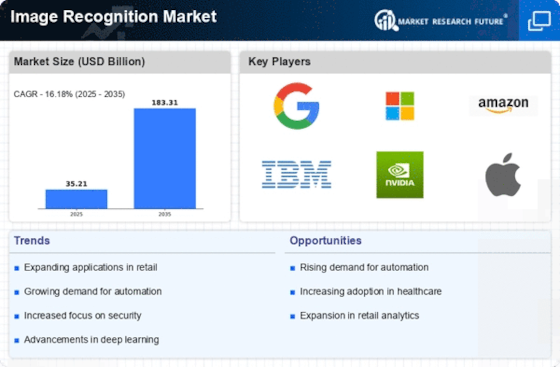Top Industry Leaders in the image recognition market

Competitive Landscape of the Image Recognition Market
The image recognition market is experiencing explosive growth, This burgeoning field has attracted a diverse range of players, each vying for a slice of the pie.
Key Players:
- Jester LTU Technologies (Japan)
- Honeywell (USA)
- Toshiba (Japan)
- Staff Technologies (Poland)
- Sharp vision software (USA)
- Qualcomm Technologies (USA)
- Panasonic (Japan)
- NEC (Japan)
- Hitachi (Japan)
Strategies Adopted:
- Product differentiation: Players are constantly innovating, developing more accurate and efficient algorithms, expanding application areas, and integrating additional functionalities like object tracking and video analytics.
- Partnerships and acquisitions: Strategic partnerships with industry leaders and targeted acquisitions are accelerating technology development and market reach.
- Open-source platforms: Many companies are contributing to open-source image recognition frameworks like TensorFlow and PyTorch, fostering collaboration and speeding up advancements.
- Verticalization: Focusing on specific industry needs with tailored solutions is a key strategy for gaining a competitive edge in lucrative sectors like healthcare, retail, and security.
Factors for Market Share Analysis:
- Accuracy and Speed of Algorithms: The ability to recognize objects and patterns with high accuracy and minimal response time is crucial for market success.
- Breadth of Applications: Companies with diverse application portfolios catering to various industries stand to gain an advantage.
- Technology Infrastructure: Robust cloud platforms, pre-trained models, and scalable data processing capabilities are essential for attracting and retaining clients.
- Ease of Integration and User Friendliness: Solutions that are easy to integrate into existing systems and user-friendly for non-technical professionals will be more desirable.
- Pricing and Business Model: Flexible pricing models and innovative solutions like pay-per-use can create a competitive edge, especially for startups.
New and Emerging Companies:
- Luminous AI: Specializes in facial recognition and identity verification applications for security and law enforcement.
- Airbyte: Focuses on aerial image analysis for agricultural and environmental monitoring.
- VSCO: Leverages image recognition to provide advanced editing tools and filters for creative professionals.
Current Company Investment Trends:
- Focus on Deep Learning: Companies are heavily investing in research and development of advanced deep learning algorithms to improve accuracy and efficiency.
- Expansion of Cloud Offerings: Cloud-based image recognition solutions are becoming increasingly popular, leading to investments in platform development and scalability.
- Data Acquisition and Management: Building and managing large datasets of labeled images is crucial for training and validating models, prompting significant investments in data infrastructure.
- Partnerships and Acquisitions: Mergers and acquisitions are expected to increase as companies seek to expand their technology portfolio and market reach.
Latest Company Updates:
October 26, 2023: Google AI unveils LaMDA 3, a new language model capable of "understanding and responding to images," blurring the lines between image recognition and language processing.
November 9, 2023: Meta announces "MakeIt", a platform using image recognition to help creators turn 2D sketches into 3D models for metaverse environments.
November 15, 2023: Clarifai partners with BMW to analyze customer service interactions using image recognition, detecting emotions and improving customer experience.
December 5, 2023: Microsoft launches Azure Cognitive Services for Retail, offering image recognition tools for product identification, shelf analytics, and customer behavior insights.
Beta feature










